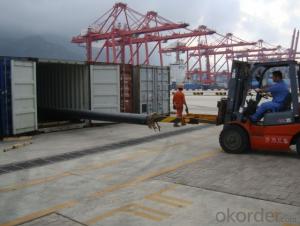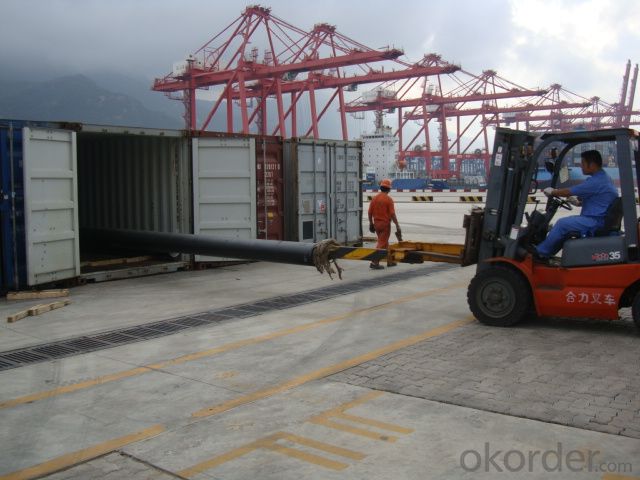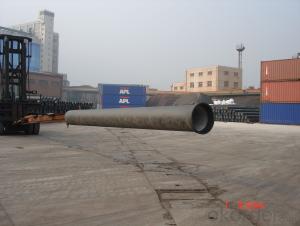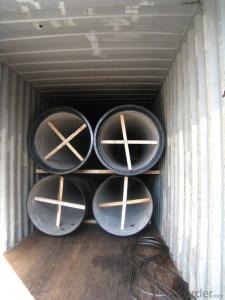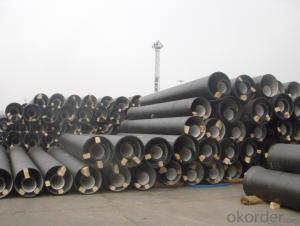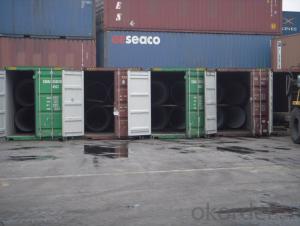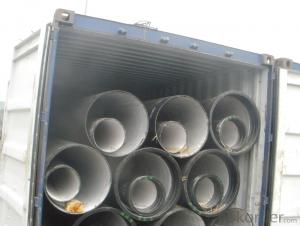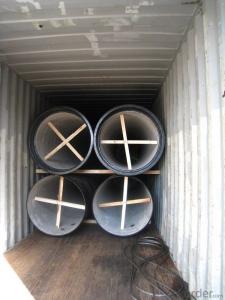DUCTILE IRON PIPE AND PIPE FITTINGS C CLASS DN1800
- Loading Port:
- Tianjin
- Payment Terms:
- TT OR LC
- Min Order Qty:
- 23 pc
- Supply Capability:
- 3000 pc/month
OKorder Service Pledge
OKorder Financial Service
You Might Also Like
· Material : Ductile Cast Iron
· Size Range : DN 80mm to DN 2000mm
· Unit Effective Length : 6m or 5.7m
· Manufacture Standard: ISO 2531:1998/ EN 545:2006/EN 598:2007
· Annual capacity : 200,000 tons
· Coating Exterior: Zinc 130g/m2 according to ISO 8179-1 and bitumen coating 70 microns.
· Cement Interior: Portland Cement/ High Alumina Cement/ Sulphate Resisting Cement Lining according to ISO 4179
· Special requirements on external coating and internal lining can be applied
· We also provide accessories such as SBR/EPDM rubber gaskets, lubricant paste, pipe caps, PE sleeves, etc.
Additional Parts:
Each pipe is strictly inspected according to related standard to ensure permanently high performance.
Easy Installation at site and service free for life
Long Service Lifespan
Quotation will arrive you within 24hours once we get your inquiry.
We guarantee offering you a competitive price.
A copy of original inspection reports of pipes will be offered after shipment.
Photos of loading process will be sent to the customer after shipment effect.
We will follow-up the delivery progress after shipment effect and update to the customer on weekly basis.
- Q: Are there any special coatings or linings used for ductile iron pipes?
- Yes, there are special coatings and linings used for ductile iron pipes. These coatings are applied to the interior and exterior surfaces of the pipes to protect them from corrosion and extend their lifespan. Common coatings include cement mortar lining, epoxy lining, and polyethylene encasement. These protective layers help prevent the formation of rust and scale, ensuring the durability and longevity of ductile iron pipes.
- Q: What is the expected bending stress capacity of ductile iron pipes?
- The expected bending stress capacity of ductile iron pipes varies depending on the specific grade and size of the pipe, as well as factors such as installation conditions and external loads. However, ductile iron pipes generally have high strength and flexibility, allowing them to withstand significant bending stresses. It is recommended to refer to the manufacturer's specifications and engineering guidelines for a more accurate estimation of the bending stress capacity of a particular ductile iron pipe.
- Q: How does ductile iron pipe perform in corrosive environments?
- Ductile iron pipe performs exceptionally well in corrosive environments due to its inherent corrosion resistance properties. The pipe's protective lining and external coatings provide an additional layer of defense against corrosion, ensuring long-term durability and reliability even in harsh conditions.
- Q: What is the expected corrosion protection system for ductile iron pipes?
- The expected corrosion protection system for ductile iron pipes typically involves a combination of external coatings, internal linings, and cathodic protection. External coatings are applied to the exterior surface of the pipe to provide a barrier against corrosion. These coatings are typically made of fusion-bonded epoxy, polyethylene, or polyurethane. They protect the pipe from the surrounding environment, including soil, water, and chemicals, and help to extend the lifespan of the pipe. Internal linings are applied to the interior surface of the pipe to protect against corrosion from the transported fluid. These linings can be made of cement mortar, epoxy, or polyurethane. They provide a smooth and protective layer, preventing the formation of rust and scale on the pipe's inner surface. Cathodic protection is an electrochemical technique used to protect ductile iron pipes from corrosion. It involves the use of sacrificial anodes or impressed current systems to create a protective electrical current that counteracts the corrosion process. This method helps to prevent the formation of rust and extends the life of the pipe. It is important to note that the specific corrosion protection system for ductile iron pipes may vary depending on the application and environmental factors. Consulting with corrosion experts and adhering to industry standards and guidelines is crucial in determining the appropriate corrosion protection system for a particular ductile iron pipe installation.
- Q: Do rigid cement cast iron pipes need cement piers?
- Ductile iron pipes mainly called centrifugal ductile iron pipe, it has the properties of nature, iron and steel, excellent corrosion resistance, good ductility, good sealing effect, simple installation, mainly for municipal, industrial and mining enterprises, water supply, gas, oil etc.. Water supply pipe is the first choice, with high cost performance. Compared with the PE pipe, from the installation time, ductile pipe PE pipe installation is simple and rapid, and after the installation of internal and external pressure bearing better tightness and corrosion resistance; from the point of view, ductile pipe sealing better after installation, but also can improve the corrosion resistance of corrosion protection through a variety of means; from the hydraulic performance, because ductile pipe specifications generally refers to the inner diameter of PE pipe diameter specifications generally refers to the same specifications, because under the condition of ductile pipe can achieve greater runoff; from the installation and maintenance cost, ductile pipe have more favorable price. The main components of ductile iron pipes are carbon, silicon, manganese, sulfur, phosphorus and magnesium. The inner wall of zinc spray, anti-corrosion materials such as cement mortar.
- Q: How do ductile iron pipes handle water hammer?
- Ductile iron pipes are known for their excellent resistance to water hammer, which refers to the sudden increase in pressure and velocity of water flow within a pipe system. This phenomenon occurs when there is a sudden change in the water's velocity, such as when a valve is closed abruptly or a pump is suddenly shut off. Ductile iron pipes are designed to withstand high-pressure surges caused by water hammer. Their enhanced strength and flexibility enable them to absorb and dissipate the energy generated during these pressure surges. The ductility of the material allows the pipe to deform slightly under the impact of the water hammer, preventing the pipe from rupturing or breaking. Moreover, ductile iron pipes have inherent damping properties, which means they can absorb and dissipate the energy of water hammer more effectively compared to other pipe materials. This helps to reduce the intensity and duration of the pressure surges, minimizing the potential damage to the pipe system and its components. Additionally, ductile iron pipes are often equipped with various fittings and accessories that further enhance their ability to handle water hammer. These include specialized joint designs, such as restrained joints or flexible couplings, which provide additional flexibility and resistance to pressure surges. Overall, ductile iron pipes are specifically engineered to handle the challenges posed by water hammer. Their strength, flexibility, damping properties, and specialized fittings make them an ideal choice for applications where water hammer is a concern, providing a reliable and durable solution for water distribution systems.
- Q: Can ductile iron pipes be used for river crossings?
- Yes, ductile iron pipes can be used for river crossings. Ductile iron is a strong and durable material that can withstand the stresses and pressures of being installed underground and crossing rivers. It is commonly used in water and sewage systems, including river crossings, due to its resistance to corrosion and its ability to handle high water pressure.
- Q: Can ductile iron pipes be used in areas with high levels of heavy metal contamination?
- Yes, ductile iron pipes can be used in areas with high levels of heavy metal contamination. Ductile iron pipes have a high resistance to corrosion, which makes them suitable for transporting water in such environments. Additionally, their durable nature helps prevent the release of heavy metals into the water supply, ensuring the safety and integrity of the system.
- Q: Classification of cast iron pipes
- Drainage cast iron pipe:Pipes and fittings for plain cast iron bearing. Flexible anti-seismic interface cast iron pipe, this kind of cast iron pipe is sealed by rubber ring and bolt fastened. It has good flexibility and flexibility under water pressure. The utility model can adapt to larger axial displacement and lateral deflection, and is suitable for indoor drainage pipes of high-rise buildings, and is particularly suitable for earthquake zones. From the interface form, can be divided into: W flexible cast iron drain pipe, B flexible cast iron drain pipe, A flexible cast iron drain pipe.
- Q: Can ductile iron pipes be used for irrigation pivot systems?
- Indeed, irrigation pivot systems can utilize ductile iron pipes. Renowned for their robustness, longevity, and resistance to corrosion, ductile iron pipes are apt for numerous purposes, including irrigation. These pipes have the capability to withstand substantial water pressure, guaranteeing a dependable and enduring means of transporting water to irrigation pivot systems. Moreover, ductile iron pipes harmonize seamlessly with a variety of fittings and connectors commonly employed in irrigation systems, thereby facilitating effortless installation and upkeep. All in all, employing ductile iron pipes in irrigation pivot systems emerges as a pragmatic decision that ensures efficacious water distribution while minimizing the likelihood of pipe failure.
Send your message to us
DUCTILE IRON PIPE AND PIPE FITTINGS C CLASS DN1800
- Loading Port:
- Tianjin
- Payment Terms:
- TT OR LC
- Min Order Qty:
- 23 pc
- Supply Capability:
- 3000 pc/month
OKorder Service Pledge
OKorder Financial Service
Similar products
Hot products
Hot Searches
Related keywords
